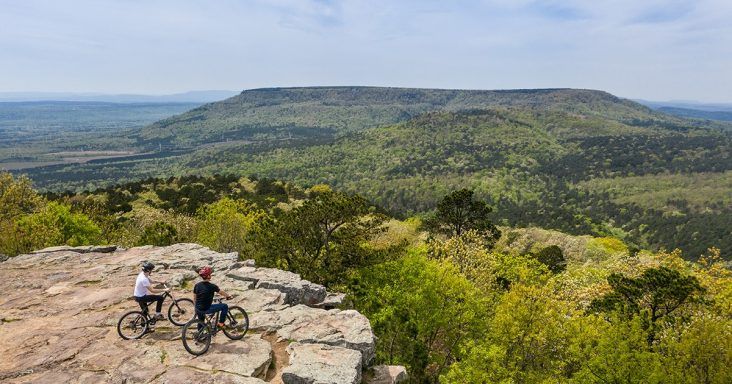Mountain bike trail opens previously inaccessible areas of Mount Nebo State Park
by July 25, 2019 4:09 pm 2,476 views

Arkansas’ second addition to the state’s Monument Trails will open Saturday (July 27) at Mount Nebo State Park in Dardanelle.
Arkansas State Parks started opening Monument Trails, a collection of destination mountain biking trails, throughout the state in June. The trails will merge “world-class riding with architecture, art and nature,” according to an Arkansas State Parks news release.
Monument Trails are a project of the recently-established nonprofit organization Arkansas Parks and Recreation Foundation (APRF). The foundation is funded through private donations and grants. A $2 million grant from the Walton Family Foundation supported the development of the first Monument Trail at Hobbs State Park in Rogers.
The trail at Mount Nebo State Park “will introduce world-class mountain biking to the larger Arkansas River Valley, providing a world-class riding option easily accessible from Russellville, Conway, Little Rock, and the Ouachita and Ozark Mountains. It is expected to provide a national and even international draw for riders wanting to travel to top mountain biking venues,” the news release said.
Monument Trails are designed for the entire family, Suzanne Grobmyer, executive director of the Arkansas Parks and Recreation Foundation, said when the first trail opened.
“The simple goal is to provide an unforgettable experience along the trail that will inspire you to seek, find and discover our state and build a sense of pride and appreciation. The Monument Trails are going to change the dynamic for communities across the state by improving quality of life and creating new economic activity,” Grobmyer said, adding the first trail at Mount Nebo is an intermediate (blue) trail that does present a few challenges for riders.
A $519,000 Walton Family Foundation grant supported the construction of the first phase of the trail at Mount Nebo. Rock Solid Trail Contracting, working with input from Arkansas State Parks, built phase one of the trail, which was named Chickalah Loop after the scenic creek that flows through that area of the park.
“The new Mount Nebo trails will be approachable for riders from around Arkansas and beyond, but the first phase features big, beautiful berms and optional advanced gaps and jumps,” said Amber Chambers, the trail project manager for APRF. “We encourage riders to ride well within their skillset. It’s important to check out a feature before attempting it.”
The seven-mile trail takes visitors through previously inaccessible parts of the park, said Park Superintendent Scott Wanieski.
“Cyclists are encouraged to park at the Bench Trail Overlook, just below the top of the mountain on Highway 155, to access the trails. The 4-mile Bench Trail continues to offer novice riders an easy green trail option around the mountain, which has its own beautiful views of the mountain,” Wanieski said.
The Monument Trails will expand access to trail systems throughout Arkansas’ state parks. Work is underway on designs and future plans in 2019, including trail systems at Pinnacle Mountain State Park in Little Rock and Devil’s Den State Park in Northwest Arkansas, the release said.
The Bentonville-based Walton Family Foundation reported in March 2018 cycling contributed $137 million to the Northwest Arkansas economy in 2017. The economic impact is broken down into health-care related costs ($86 million) by keeping children and adults active and decreasing the prevalence of adverse health conditions, and business benefits ($51 million) that include spending, retail sales and sales taxes and tourism spending by out-of-state visitors. The foundation also has been active in soliciting support from public and private entities for biking trails and related amenities.
The U.S. Bureau of Economic Analysis reported in February 2018 that outdoor recreation spending accounted for 2% of the GDP – or $374 billion – in 2016. That year, the outdoor recreation economy showed faster growth than the overall U.S. economy, increasing 3.8%, versus a 2.8% uptick in the overall economy.
The 2016 data was the first time the bureau released federal statistics on outdoor recreation as its own category within the GDP.
On a national level, conventional core outdoor activities in 2016 accounted for 37% of the total gross output associated with outdoor recreational spending. Those activities include bicycling, boating, hiking, hunting and others. Other core activities — a category which includes agritourism and outdoor festivals — accounted for 22%, and supporting activities made up 41%.
